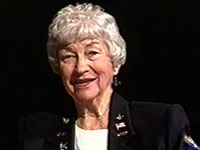|
"It didn't matter to us that we didn't have those [military privileges]. First, we were doing something that we loved to do. And also, we were helping our country. And we knew they really needed us." (Video Interview, 15:25)
|
|
{
align: 'left'
}
|
Mildred Darlene Tuttle Axton |

Mildred Axton [2003] | World War, 1939-1945
WASP (Women Airforce Service Pilots)
Pecos, Texas
KS
 |
|
 |
Mildred "Micky" Axton considers herself very lucky to have had her childhood dream of flying fulfilled when a neighbor, a barnstorming pilot, took up her and her brother for rides. She graduated from Kansas State University and joined the Civilian Pilot Training Program, which led to her volunteering for the WASP. Her main duty, in the isolated West Texas outpost of Pecos, was to test planes, replacing men grateful for the chance to apply their flying skills in combat. Axton left behind a husband, who worked in an aircraft plant, and an infant, whom her mother agreed to care for. Her brother was a flier, too, in the Pacific Theater, where he survived being shot down and spending 14 hours in shark-infested water. Her career in the WASP was cut short when her mother took ill and she had to resign to care for her and the child.
|
|

